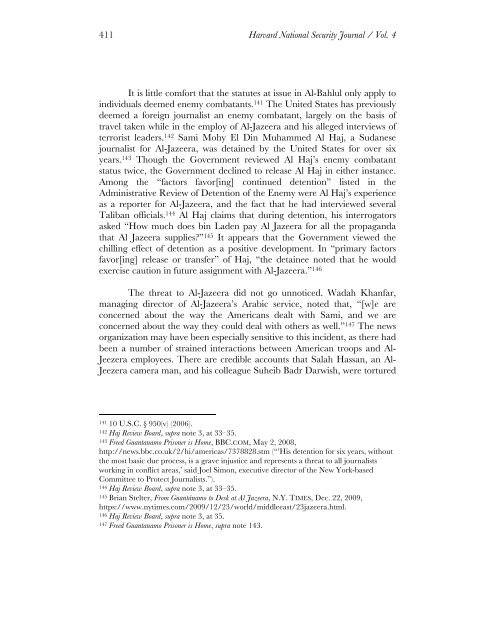Vo.4-Moshirnia-Final
Vo.4-Moshirnia-Final
Vo.4-Moshirnia-Final
Create successful ePaper yourself
Turn your PDF publications into a flip-book with our unique Google optimized e-Paper software.
411 Harvard National Security Journal / Vol. 4<br />
It is little comfort that the statutes at issue in Al-Bahlul only apply to<br />
individuals deemed enemy combatants. 141 The United States has previously<br />
deemed a foreign journalist an enemy combatant, largely on the basis of<br />
travel taken while in the employ of Al-Jazeera and his alleged interviews of<br />
terrorist leaders. 142 Sami Mohy El Din Muhammed Al Haj, a Sudanese<br />
journalist for Al-Jazeera, was detained by the United States for over six<br />
years. 143 Though the Government reviewed Al Haj’s enemy combatant<br />
status twice, the Government declined to release Al Haj in either instance.<br />
Among the “factors favor[ing] continued detention” listed in the<br />
Administrative Review of Detention of the Enemy were Al Haj’s experience<br />
as a reporter for Al-Jazeera, and the fact that he had interviewed several<br />
Taliban officials. 144 Al Haj claims that during detention, his interrogators<br />
asked “How much does bin Laden pay Al Jazeera for all the propaganda<br />
that Al Jazeera supplies?” 145 It appears that the Government viewed the<br />
chilling effect of detention as a positive development. In “primary factors<br />
favor[ing] release or transfer” of Haj, “the detainee noted that he would<br />
exercise caution in future assignment with Al-Jazeera.” 146<br />
The threat to Al-Jazeera did not go unnoticed. Wadah Khanfar,<br />
managing director of Al-Jazeera’s Arabic service, noted that, “[w]e are<br />
concerned about the way the Americans dealt with Sami, and we are<br />
concerned about the way they could deal with others as well.” 147 The news<br />
organization may have been especially sensitive to this incident, as there had<br />
been a number of strained interactions between American troops and Al-<br />
Jeezera employees. There are credible accounts that Salah Hassan, an Al-<br />
Jeezera camera man, and his colleague Suheib Badr Darwish, were tortured<br />
141 10 U.S.C. § 950(v) (2006).<br />
142 Haj Review Board, supra note 3, at 33–35.<br />
143 Freed Guantanamo Prisoner is Home, BBC.COM, May 2, 2008,<br />
http://news.bbc.co.uk/2/hi/americas/7378828.stm (“’His detention for six years, without<br />
the most basic due process, is a grave injustice and represents a threat to all journalists<br />
working in conflict areas,’ said Joel Simon, executive director of the New York-based<br />
Committee to Protect Journalists.”).<br />
144 Haj Review Board, supra note 3, at 33–35.<br />
145 Brian Stelter, From Guantánamo to Desk at Al Jazeera, N.Y. TIMES, Dec. 22, 2009,<br />
https://www.nytimes.com/2009/12/23/world/middleeast/23jazeera.html.<br />
146 Haj Review Board, supra note 3, at 35.<br />
147 Freed Guantanamo Prisoner is Home, supra note 143.
















